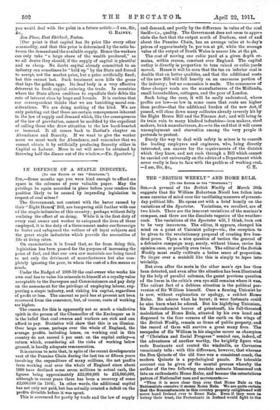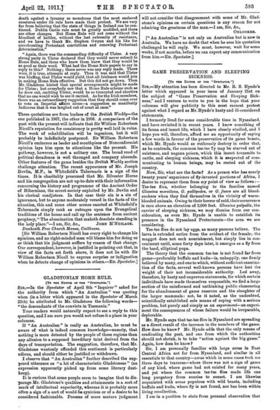THE "BRITISH WEEKLY" AND HOME RULE.
[To THE EDITOB OF THE " SPEC/ATI:M."1 SIB,—A perusal of the British, Weekly of March 30th suggests that Sir William Robertson Nicoll has fallen into•
some exercise of mind over the vacillating manners of present. day political life. He opens out with a brief homily on the
variations of the Spectator. Variations, we recollect, are of two kinds. There are the innocent variations of the mariner's compass, and there are the dissolute vagaries of the weather- cock. The variations of the Spectator will, I think, turn out to be very innocuous. The editor, it appears, changed his
mind on a point of Unionist policy—viz., the reception to be given to the revolutionary proposal of creating five hun- dred peers. Upon a nice question of tactics the general of a defensive campaign may, surely, without blame, revise his
opinion once, or possibly even twice. The editor of the British. Weekly must really cultivate a better sense of proportion. To linger over a molehill like this is simply to lapse into
triviality.
But even after the mote in the other man's eye has thus been detected, and even after the situation has been illustrated by the help of parallel columns, the gaunt previous question of the beam in the critic's own eye still remains where it was. The salient fact of a dubious situation is the political per.
version of Sir William himself. Once a flaming Unionist he is now, without explanation or apology, a red-hot Home Ruler. He adores what he burnt ; it were fortunate could he also burn what he adored. But his highflying Unionism, his Nonconformist horror of priestcraft, his full-throated malediction of Home Rule, attested by his own hand and
dispersed to the four corners of the earth on the -wings of the British Weekly, remain as items of public property, and
the record of them will survive a great many fires. The escapades of Sir William in his singular career as champion of " Christian and Social Progress " remind one indeed, of the adventures of another worthy, the knightly figure who rode Rosinante and routed the windmills, as Cervantes veraciously tells : with this difference, however, that whereas the Don Quixote of the old time was a consistent crank, the modern Quixote is a psychological puzzle. No tolerable account can be given of the mental process whereby the author of the two following resolute extracts blossomed out into an enthusiastic Home Ruler, and became the ostentatious patron of Nationalist men and movements :— "Thus it is more clear than ever. that Home Rule as the Nationalists conceive it means Rome Rule. We are quite certain that the Nonconformists in this countzy properly enlightened with never band Ireland over to Rome Rule. Even if they were to betray their trust, the Protestants in Ireland would fight to the
death against a tyranny so monstrous that the most enslaved creatures under its rule have made their protest. We are very far from believing that the state of things in Ireland can be con- tinued. Dublin Castle rule must be greatly modified, and there are other changes But Home Rule will not come without the bloodiest of battles, without the last extremity of resistance, and we have to thank Mr. Stephen Gwynn and his like for corroborating Protestant convictions and renewing Protestant determination."
"Again, there was the commanding difficulty of Ulster. A very strong party in Ulster declared that they would never submit to Home Rule, and those who knew them knew that they would be as good as their word. What had the Home Rule papers to say in reply to this? Nothing ; there never was any reply made. There were, it is true, attempts at reply. Thus it was said that Ulster was bluffing, that Ulster would yield, that all Irishmen would join in making Home Rule effective. But this did not go down. Then Mr. Gladstone hinted that special arrangements might be made for Ulster; but everybody saw that a Home Rule scheme such as he drew out, omitting Ulster, would be so truncated and abortive that no one would wish to see it carried. As for the Irish members, there was an extraordinary suggestion that they should come over to vote on Imperial affairs alone—a suggestion so manifestly ludicrous that it was laughed out of court at once."
These quotations are from leaders of the British Weekly—the one published in 1907, the other in 1906. A comparison of the
past with the present will indicate that Sir William Robertson Nicoll's reputation for consistency is pretty well laid in ruins. The work of rehabilitation will be ingenious, but it will probably be indefinitely postponed. Sir William Robertson Nicoll's eminence as leader and mouthpiece of Nonconformist opinion lays him open to attentions like the present. His pathway, however, is not a solitary one. The broad road of
political decadence is well thronged and company abounds. Other features of the game besides the British Weekly section
challenge attention. The recent appearance of Mr. Joseph Devlin, M.P., in Whitefield's Tabernacle is a sign of the times. It is charitably presumed that Mr. Silvester Home and his congregation are not up-to-date with their information concerning the history and programme of the Ancient Order of Hibernians, the secret society exploited by Mr. Devlin and his clerical coadjutors. In that case their sin is a sin of ignorance, but to anyone moderately versed in the facts of the situation, this and some other scenes enacted at Whitefield's Tabernacle simply rank as outrages upon the Evangelical traditions of the house and call up the sentence from ancient prophecy, " The abomination that maketh desolate standing in the holy place."—I am, Sir, &c., JOHN M'NEILAGE.
Dunbeath Free Church Manse, Caithness.
[Sir William Robertson Nicoll has every right to change his opinions, and no right-minded man will blame him for doing so or think that his judgment suffers by reason of that change.
Our correspondent, however, is justified in pointing out that, in view of the facts set forth above, it does not lie with Sir William Robertson Nicoll to express surprise or indignation when he detects change of opinions in others.—En. Spectator.]







































 Previous page
Previous page